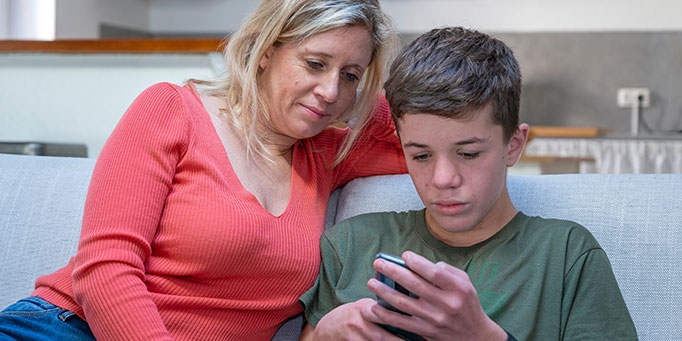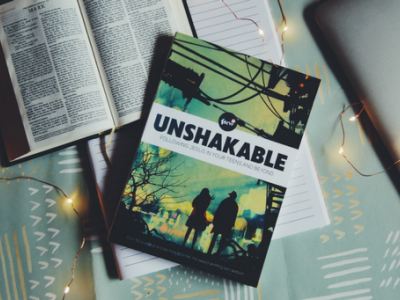
Support for the parenting danger zone
Onward Youth Conference helps kids (and parents) navigate tough questions.
I’m hitting the parenting danger zone. My eldest son is nearly 12. He’s started youth group and goes to a Christian school. But he’s meeting more people, accessing more information online and watching the news. He is moving outside of our ‘safe bubble’ and being hit square in the face with issues that he needs to understand and form an opinion about.
And this can be tricky. I want to support him to learn and grow and stretch. But I also want to give him the tools to think about these issues through the lens of his faith. I don’t want him to blindly and doggedly accept things that I tell him without thinking them through himself. I want him to be able to reason through the life questions knowing that God and Scripture are his ultimate authority. I want him to start to apply his gospel knowledge. This is the beginning of learning to exercise wisdom and discernment.
The issues he is facing can range from how to describe people without offence, through to bullying, gender, sex outside of marriage, identity, same-sex attraction, broken churches and more. How, at 12 years old, can he even begin to navigate this stuff? And how can I support him?
There’s no point trying to avoid or put off the issues—he is facing them now. And frankly, they are important issues so I would be doing him a great disservice if I didn’t equip him. I would be doing an even greater disservice to him and God if I left him to wander or be carried along by the culture around him.
Doubt is not unbelief
According to AJ Swoboda (author of After Doubt), we live in a culture that encourages the deconstructing of our faith in order to ‘evolve’ as a new, modern, post-Christian human. He writes, ‘Being an “evolved” person means breaking with these past superstitions. Being post-anything is now a sign of arrival and maturity … Being post-something is powerful and intoxicating. We’ve been there. We’ve left. We’ve transcended’.
At a time when my son is starting to form his identity in a culture that seeks uniqueness but lives and breathes group-think, there is a danger that these issues will force him to deconstruct his faith. And never look back.
But, as Swoboda points out, there is a big difference in Scripture between doubt and unbelief. Judas did not believe. Peter doubted. The difference was that Peter recognised his doubt and came back. Sometimes we doubt and ask questions. Sometimes we deconstruct our faith—but that is not the destruction of our faith. It is picking apart what we believe and why we believe it and re-building it with a better, deeper and stronger understanding. Swoboda points to the Bible, which encourages us to ‘give careful thought to your ways’ (Haggai 1:7) and to ‘watch your life and doctrine closely’ (1 Timothy 4:16).
Even for grown-ups, this can be tricky, but we can muddle our way through with the help of church on Sunday, Bible study and our own reading. It’s not such a straightforward process for tweens and teens. They might get to talk about some of these knotty issues at youth group but not necessarily really unpick them with their peers. They might not have enough understanding to ask the right questions (or even know what questions to ask). They might internalise the issues, trying to work it out on their own for fear of looking silly. They might stifle it, put off thinking about it or ignore it. This effectively leaves their faith standing on a faulty foundation, which may cause the building of their faith to fall later on.
Onward Youth Conference
As a parent I need help to support my kids. And I want their youth leaders to have the best possible support too, so that between us we can help them to navigate this time.
That’s why I joined the committee for Onward Youth Conference. It’s designed for exactly this purpose—to equip our children and those who lead them to engage with culture and to empower them to be Christians in their everyday lives. It’s designed to help high schoolers make sense of the world around them through a gospel lens, and equip them to stand firm for their faith.
The topic this year is ‘Doesn’t Christianity crush diversity?’ Sometimes Christianity is seen as restrictive or harmful by favouring some types of people and excluding others. What about women? What about the LGBTQ community? What about people who are vulnerable? Our range of speakers includes Dave Jensen, who will unpack how Christianity actually creates beautiful diversity in Jesus and international apologist Amy Orr-Ewing, who will share about how Christianity has lifted up women in history.
Of course, a topic like this can’t be totally addressed on one night, so we’ve designed an online ‘Deep Dive’ program for groups or individuals to complete over three further sessions. This includes talks, curated resources and discussion questions to explore the topic more.
As a parent, I am so grateful for this resource. I’m looking forward to encouraging my kids and the youth group to go, and accessing it myself online. Doing this will allow me to continue the conversation with my children, as well as equip me to engage with culture and empower me as a Christian parent.
I am under no illusion that my kids’ faith will be a product of my parenting alone. It is God who will ultimately bring them to himself. But the Bible exhorts us parents to bring our children up in his ways and teach them diligently (Deuteronomy 6:6–7; 11:19). So, I need to find ways to help them navigate the world and deconstruct their faith without destruction. I need to give them tools to apply their theology and feel confident in what they believe. Ultimately, I need to create the space for God to do his work in them, ‘being confident of this, that he who began a good work in you will carry it on to completion until the day of Christ Jesus’ (Philippians 1:6).
That’s why I’m going to take or send my son to Onward Youth Conference. It’s on in-person at Chatswood Concourse on Friday June 24, but also with an online option. It costs $29 per ticket and is aimed at youth, youth leaders and youth ministers.
Where to from here?
• Register for the conference.
• Follow Onward Youth on Facebook and Instagram.
• Forward these details to your church youth group leaders.
Aside from Onward Youth Conference, AJ Swoboda’s After Doubt is aimed at a broad audience but is a good book for parents facing those ‘deconstruction’ years.
Two good books for your kids to read, or to read together and talk about, are Kevin deYoung’s Just Do Something and Rebecca McLaughlin’s 10 Questions Every Teen Should Ask (and Answer) about Christianity.
Youthworks Media also has a great range of books for Youth.
---
Ruth Baker is a single mum of two boys. She blogs at ‘Meet me where I am’ and is the author of Are We There Yet? (ArkHouse Press, 2020).

A New Freedom
This book is like a training manual on how to approach life—a beginner’s guide to Christian ethics. It provides a framework for approaching any topic in a comprehensive and biblically faithful way, explaining why Jesus and his word help us live in freedom. It then gives practical examples of how to use this framework to think biblically by going through six key youth topics: study, money, suffering, violence, sex and identity.
For more articles from Growing Faith, subscribe to our monthly e-newsletter.
To hear about the latest books and resources from Youthworks Media, subscribe here.








